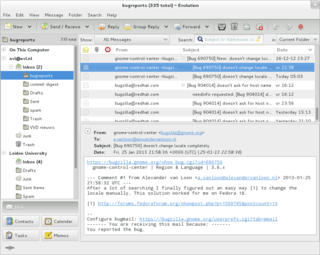Related Research Articles

Electronic mail is a method of exchanging messages ("mail") between people using electronic devices. Email was thus conceived as the electronic (digital) version of, or counterpart to, mail, at a time when "mail" meant only physical mail. Email later became a ubiquitous communication medium, to the point that in current use, an email address is often treated as a basic and necessary part of many processes in business, commerce, government, education, entertainment, and other spheres of daily life in most countries. Email is the medium, and each message sent therewith is called an email.
Multipurpose Internet Mail Extensions (MIME) is an Internet standard that extends the format of email messages to support text in character sets other than ASCII, as well as attachments of audio, video, images, and application programs. Message bodies may consist of multiple parts, and header information may be specified in non-ASCII character sets. Email messages with MIME formatting are typically transmitted with standard protocols, such as the Simple Mail Transfer Protocol (SMTP), the Post Office Protocol (POP), and the Internet Message Access Protocol (IMAP).
The Simple Mail Transfer Protocol (SMTP) is an Internet standard communication protocol for electronic mail transmission. Mail servers and other message transfer agents use SMTP to send and receive mail messages. User-level email clients typically use SMTP only for sending messages to a mail server for relaying, and typically submit outgoing email to the mail server on port 587 or 465 per RFC 8314. For retrieving messages, IMAP is standard, but proprietary servers also often implement proprietary protocols, e.g., Exchange ActiveSync.
A mailing list is a collection of names and addresses used by an individual or an organization to send material to multiple recipients. The term is often extended to include the people subscribed to such a list, so the group of subscribers is referred to as "the mailing list", or simply "the list."

Gnus, or Gnus Network User Services, is a message reader which is part of GNU Emacs. It supports reading and composing both e-mail and news and can also act as an RSS reader, web processor, and directory browser for both local and remote filesystems.

Apple Mail is an email client included by Apple Inc. with its operating systems macOS, iOS, iPadOS and watchOS. Apple Mail grew out of NeXTMail, which was originally developed by NeXT as part of its NeXTSTEP operating system, after Apple's acquisition of NeXT in 1997.

GNU Mailman is a computer software application from the GNU Project for managing electronic mailing lists. Mailman is coded primarily in Python and currently maintained by Abhilash Raj. Mailman is free software, licensed under the GNU General Public License.
The term Listserv has been used to refer to electronic mailing list software applications in general, but is more properly applied to a few early instances of such software, which allows a sender to send one email to a list, which then transparently sends it on to the addresses of the subscribers to the list.
S/MIME is a standard for public key encryption and signing of MIME data. S/MIME is on an IETF standards track and defined in a number of documents, most importantly RFC 3369, 3370, 3850 and 3851. It was originally developed by RSA Data Security and the original specification used the IETF MIME specification with the de facto industry standard PKCS#7 secure message format. Change control to S/MIME has since been vested in the IETF and the specification is now layered on Cryptographic Message Syntax (CMS), an IETF specification that is identical in most respects with PKCS #7. S/MIME functionality is built into the majority of modern email software and interoperates between them. Since it is built on CMS, MIME can also hold an advanced digital signature.
An email attachment is a computer file sent along with an email message. One or more files can be attached to any email message, and be sent along with it to the recipient. This is typically used as a simple method to share documents and images.
MHTML, an initialism of "MIME encapsulation of aggregate HTML documents", is a web page archive format used to combine, in a single computer file, the HTML code and its companion resources that are represented by external hyperlinks in the web page's HTML code. The content of an MHTML file is encoded using the same techniques that were first developed for HTML email messages, using the MIME content type multipart/related. MHTML files use a .mhtml or .mht filename extension.
Majordomo is a mailing list manager (MLM) developed by Brent Chapman. It is written in Perl and works in conjunction with sendmail on UNIX and related operating systems. The name majordomo is derived from the Latin "major domus" meaning "master of the house"; in English, the word is used to refer to a large household's chief servant.

Conversation threading is a feature used by many email clients, bulletin boards, newsgroups, and Internet forums in which the software aids the user by visually grouping messages with their replies. These groups are called a conversation, topic thread, or simply a thread. A discussion forum, e-mail client or news client is said to have a "conversation view", "threaded topics" or a "threaded mode" if messages can be grouped in this manner. An email thread is also sometimes called an email chain.
Jakarta Mail is a Jakarta EE API used to send and receive email via SMTP, POP3 and IMAP. Jakarta Mail is built into the Java EE platform, but also provides an optional package for use in Java SE.
Domain-based Message Authentication, Reporting and Conformance (DMARC) is an email authentication protocol. It is designed to give email domain owners the ability to protect their domain from unauthorized use, commonly known as email spoofing. The purpose and primary outcome of implementing DMARC is to protect a domain from being used in business email compromise attacks, phishing email, email scams and other cyber threat activities.
An email storm is a sudden spike of "reply all" messages on an email distribution list, usually caused by a controversial or misdirected message. Such storms can start when even one member of the distribution list replies to the entire list at the same time in response to an instigating message. When other members respond, pleading for the cessation of messages, asking to be removed from the list, or adding vitriol to the discussion this triggers a chain reaction of email messages. The sheer load of traffic generated by these storms can render the email servers inoperative, similar to a distributed denial-of-service attack.
GroupServer is a computer software application from OnlineGroups.net for managing electronic mailing lists.
OG Mailinglist is a module that turns Drupal into a listserv, allowing it to run multiple electronic mailing lists. OG Mailinglist is coded primarily in PHP and requires the Organic Groups modules as well as Phpmailer to run. It is currently maintained by Kyle Mathews and Mattias Põldaru. OG Mailinglist is free software, subject to the requirement of the GNU General Public License. It works with Unix style mail servers such as Postfix, Exim and qmail. It also can interface with Mailgun from Rackspace.

Efail, also written EFAIL, is a security hole in email systems with which content can be transmitted in encrypted form. This gap allows attackers to access the decrypted content of an email if it contains active content like HTML or JavaScript, or if loading of external content has been enabled in the client. Affected email clients include Gmail, Apple Mail, and Microsoft Outlook.